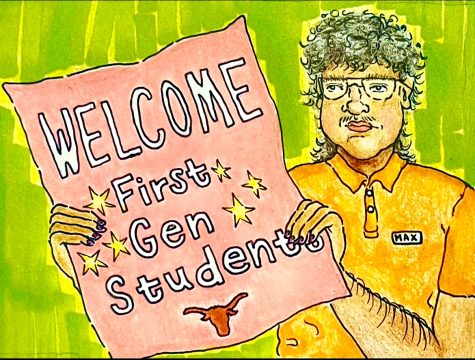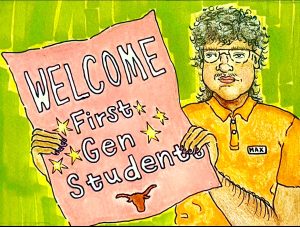Create a pre-auditing enrollment exam
March 9, 2023
Language is a necessary force between divergent cultures that fosters human connection, and language education is arguably one of the most fruitful in one’s academic career. Access to language classes, whether or not they are required for a major, must be better fostered by an academic institution of UT’s caliber.
UT offers an auditing system in which students can attend specific classes for scholastic enrichment without receiving a letter grade. The requirements for enrolling in these courses include obtaining a Class Auditor Permit and permission from the course instructor and student dean. However, fields of study are allowed to further restrict their policy, such as the languages listed under the Middle Eastern Studies program, which do not allow auditing under any conditions. This decision takes a vital scholastic experience away from students who, under varying circumstances, are unable to officially enroll in their preferred classes.
UT has 13 undergraduate schools under its umbrella. Of these programs, many do not hold a language requirement. Non-required students may want to learn another language. However, they might be unable to enroll due to a lack of space in their schedules or an inability to afford periphery classes.
Siddharth Bhargav, a freshman mechanical engineering student, expressed that the engineering course load is so rigorous that taking a non-required course for credit would be extremely taxing, and high tuition makes language seem like more trouble than it is worth.
“Every dollar (I’d) spend (on a language course) is something I’m not spending on an engineering class,” Bhargav said. “If you want to take a second language … I think that should be available, but I do not think it should be required. It is virtually impossible unless you’ve taken AP credits and like a bunch of other stuff in high school to do anything but your degree at UT (as an engineering student), because there’s no way you’d graduate in time.”
Despite this, studies show that a second language is arguably one of the most useful skills one can learn, with benefits ranging from improved memory and greater cognitive development to greater open-mindedness about cultural differences, which often plays a part in the corporate world.
From UT administration’s end, uncommitted students are a concern for allowing audits in language courses. Kelly Houck, graduate program coordinator for the Middle Eastern Studies department, explained that the lack of a letter grade and subsequently low-stakes nature of auditing a language course may stifle the experience for enrolled students.
“For first-year classes, we teach those intensively … class happens every single day of the week. You have homework every single night,” Houck said. “When you add a student who isn’t even technically enrolled in the class into the mix, it can bring the quality of the class down for those students who are committed and taking it for a letter grade (and) having it count towards their major.”
Though many language courses offered by UT are intensives — meaning they are held every day, and considered more rigorous — not every one is. To bolster multilingualism and give the opportunity to students with extenuating circumstances, UT language programs should better accommodate students looking to audit non-intensive language courses.
The worry that enrolled students’ experiences may be muddled by less-committed auditors is understandable. However, those who are curious enough to sign up for a notoriously difficult class that was not required of them have already proven a high level of commitment to their education.
Students could have to test into the language courses they want to audit. A pre-audit enrollment exam would weed out those unwilling to put in work or unable to match enrolled students’ skill levels. This would also give more enthusiastic auditors a chance to delve into a subject they may not have otherwise been exposed to. It’s a change that could make a distinct difference in their cultural and corporate experiences.
In many instances, those who speak a second language at home are also able to adequately converse and understand it well enough to take a college-level class in that tongue. If there was an option to test into content courses spoken in another language, students with a background in the form could become better acclimated with their culture — whether or not it is a requirement for their career path.
A test-in audit is a necessary addition to language courses. Ultimately, any student looking to enrich their educational experience should be given the option — especially in a world-class institution like UT.
Hosseini is an International Relations freshman from Sugar Land, Texas.











